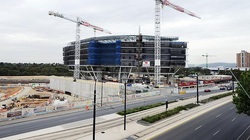
DEVELOPERS have earmarked more than $2.5 billion of major city projects since the State Government relaxed planning regulations in March last year.
The Development Assessment Commission has approved close to $700 million worth of projects since then and is assessing two more valued at $84 million.
A further 24 projects worth $1.8 billion are progressing through the commission's pre-lodgement process, including the $350 million expansion of Adelaide Casino.
Of the remaining 23, 15 are mixed-use projects with combinations of apartments, ho-tels, offices and retail, but the Government would not pro-vide specific details.
And development industry leaders say the reforms have the potential to spark a private-building boom led by international investors.
They say the growth will transform the city skyline over the next decade, complementing the rush of major public projects under construction such as Adelaide Oval and the new Royal Adelaide Hospital.
The reforms doubled building heights to 30 storeys on parts of King William, Pulteney, Currie, Grenfell and Flinders streets, allowed 15-storey buildings on Gouger and Hindley streets and the terraces, and removed height limits for sites of more than 1500sq m.
Developers can choose to collaborate with Government planners in a case-management service to refine applications before they are lodged, in order to slash formal approval times from six months to as little as a few weeks.
Master Builders Association SA acting chief executive David Callan said allowing bigger projects made Adelaide more attractive to developers.
"What's been most important is the lack of restraints and obstacles in seeking development approval so we can go ahead and build things in the CBD," he said.
"We've seen particularly some international money funding some higher and medium-density developments in Adelaide, which is all very good for our economy."
Property Council SA executive director Nathan Paine said the changes had given developers "greater capacity to generate an economic income".
This was despite the industry still struggling with low levels of demand and confidence.
Planning Minister John Rau said the surge in building activity "demonstrates confidence in the construction and commercial development industry in South Australia".
The Development Assessment Commission has approved close to $700 million worth of projects since then and is assessing two more valued at $84 million.
A further 24 projects worth $1.8 billion are progressing through the commission's pre-lodgement process, including the $350 million expansion of Adelaide Casino.
Of the remaining 23, 15 are mixed-use projects with combinations of apartments, ho-tels, offices and retail, but the Government would not pro-vide specific details.
And development industry leaders say the reforms have the potential to spark a private-building boom led by international investors.
They say the growth will transform the city skyline over the next decade, complementing the rush of major public projects under construction such as Adelaide Oval and the new Royal Adelaide Hospital.
The reforms doubled building heights to 30 storeys on parts of King William, Pulteney, Currie, Grenfell and Flinders streets, allowed 15-storey buildings on Gouger and Hindley streets and the terraces, and removed height limits for sites of more than 1500sq m.
Developers can choose to collaborate with Government planners in a case-management service to refine applications before they are lodged, in order to slash formal approval times from six months to as little as a few weeks.
Master Builders Association SA acting chief executive David Callan said allowing bigger projects made Adelaide more attractive to developers.
"What's been most important is the lack of restraints and obstacles in seeking development approval so we can go ahead and build things in the CBD," he said.
"We've seen particularly some international money funding some higher and medium-density developments in Adelaide, which is all very good for our economy."
Property Council SA executive director Nathan Paine said the changes had given developers "greater capacity to generate an economic income".
This was despite the industry still struggling with low levels of demand and confidence.
Planning Minister John Rau said the surge in building activity "demonstrates confidence in the construction and commercial development industry in South Australia".


 RSS Feed
RSS Feed